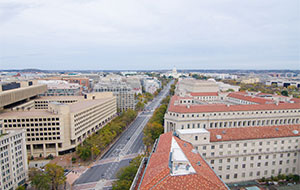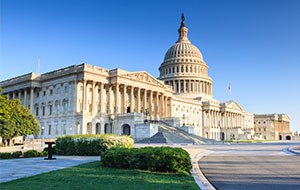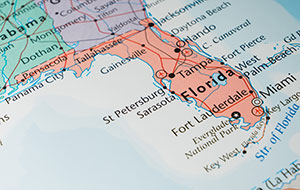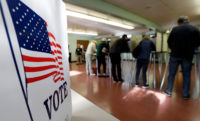Absentee / Mail-in Voting
All states have some form of absentee or mail-in voting due to federal requirements. These voters normally include military and overseas citizens, voters with disabilities and students who reside in a different state. For example, absentee or mail-in ballots are sent to these military and overseas voters 45 days prior to federal elections. However, absentee or mail-in voting is often limited by states to a number of valid excuses based on age, absentee status or an inability to vote on Election Day.
Some states have a greater number of reasons and valid excuses to vote absentee ballots by mail or in-person in an election office. A number of states have no-excuse absentee or mail voting. Lastly, a number of states have implemented an entire method of mail-in balloting that includes return of ballots to secure boxes or by postal mail. Oregon instituted an all-mail-in balloting system in 1998 and other states like Washington and Colorado have instituted similar all mail ballot methods of voting.
Mail-in and absentee balloting provides certain vulnerabilities to the electoral system:
- One stated general purpose for no-excuse absentee or mail ballot voting is to increase convenience and reduce long lines on Election Day. However, “Election Day” has become “Election Month,” which has increased the overall costs of election administration. County election offices that must process a large number of mailed ballots will experience significant delays in releasing official election results. A month or more of voting dramatically increases the overall costs to political campaigns for poll watching and get-out-the-vote efforts prior to Election Day.
- Mail-in ballots are not cast in the secure polling place where precinct poll workers can confirm addresses and verify identification. A great deal of voter fraud and abuse of absentee and mail-in ballots has been documented across the country. Absentee or mail-in balloting may spur a short-term increase in turnout in local elections; however, there is no evidence that voting by mail increases overall turnout for the long term in general elections.
- Absentee or mail-in balloting requires the use of the U.S. Postal Service (USPS) to transmit and return the ballot. This often causes delays to the election office. Citizens in states that use mail-in ballots often authorize the return of ballots to secure mail boxes that voters can use if they distrust the postal service.
A number of states authorize or require in-person absentee voting with verification by voter ID, and some states require a voter ID at the time of absentee or mail-in ballot request or return.
Alternatively, many states that allow absentee or mail-in voting use signature comparison to verify the identity of the voter. Many believe that signature verification is error-prone and not uniformly implemented by election officials across the country. While signature verification does catch a small percentage of invalid ballots or voter fraud, the system often fails to identify a great many irregularities associated with absentee or mail-in voting. Alternatively, many argue that signature verification routinely disenfranchises thousands of voters when it is used to ferret out an invalid signature.
ACRU Commentary
Accurate Voter Registration Lists Are Essential to Election Integrity
Enabling fraud is not the only problem with messy voter registration rolls.
Early Voting Disadvantages Seem to Outweigh Benefits
The longer the window of early voting, the greater the effect on lowering turnout.
The Old Vote Scam in the Mountains
For example, AmeriCorps workers came to New Hampshire and claimed a public park as their home address.
New Report Exposes Thousands of Illegal Votes in 2016 Election
"With this report, we may have a clue as to why some states are resisting providing this data."
Video: Hans von Spakovsky’s Opening Statement to the Presidential Commission on Election Integrity
My German mother grew up in Nazi Germany. My Russian father fought and escaped communism twice.
Former Florida Mayor Gets Probation over Vote Buying Scheme
Prosecutors said he offered bribes and lowered rent in exchange for votes by absentee ballots.
News
Pennsylvania – watchdog group finds 800K questionable registered on county voter rolls
Judicial Watch announced today that it filed a lawsuit against Pennsylvania and three of its counties for failing to make reasonable efforts to remove ineligible voters from their rolls as required by the federal National Voter Registration Act of 1993 (NVRA).
North Carolina and nationwide – liberal group mails applications partially filled out
A voter registration group is sending hundreds of thousands of mail-in and absentee ballot applications to voters in states that do not automatically mail the ballot applications themselves.
Indiana – Democrat precinct chair accused of ‘pre-marking” 300 ballot applications
A trial date has been set for an Evansville woman charged with pre-marking absentee ballot applications before this past June's Indiana primary.
Virginia – 500,000 incorrect applications send out
Elections officials in Virginia are trying to set the record straight, after absentee ballot applications with incorrect information were mailed to more than half a million residents in the Commonwealth. The confusing mailers were sent by an organization known as 'The Center For Voter Information', which identifies itself as "non-partisan and non-profit" on its website.
Washington State election expert recognizes looming VBM dangers
“Universal voting by mail is an attractive and easy unconventional warfare target for the creation of election chaos, causing civil unrest and destabilizing society in general.” From personal and professional experience, former deputy prosecuting attorney Barney Waldrop speaks up about the importance of voting in person and the dangers of universal vote by mail.
Another dead voter in New Mexico
It’s not funny, actually. A grieving New Mexico widow visited her county election office to ask them to stop sending absentee ballots to her deceased husband who had passed away the year before in another [...]












